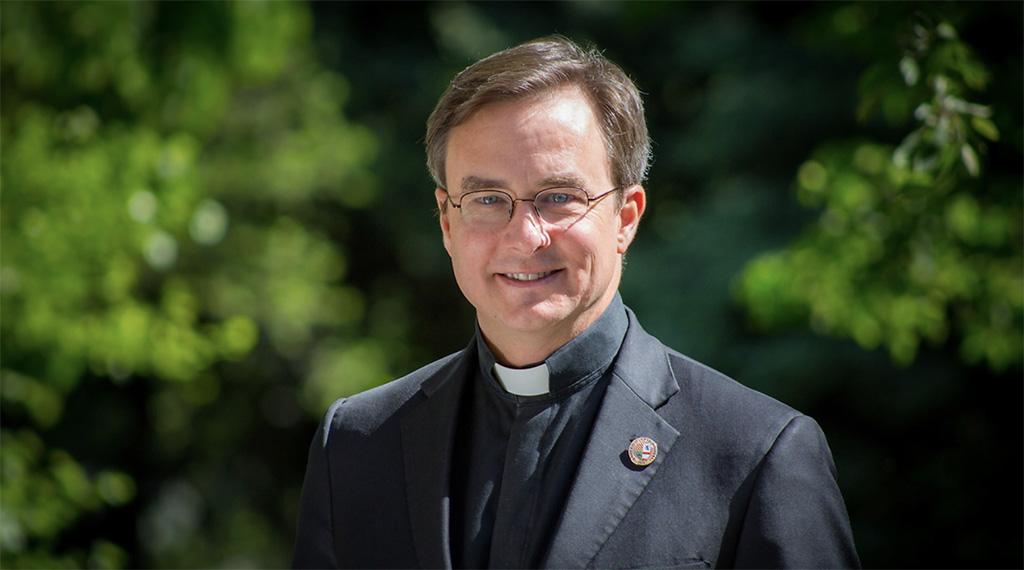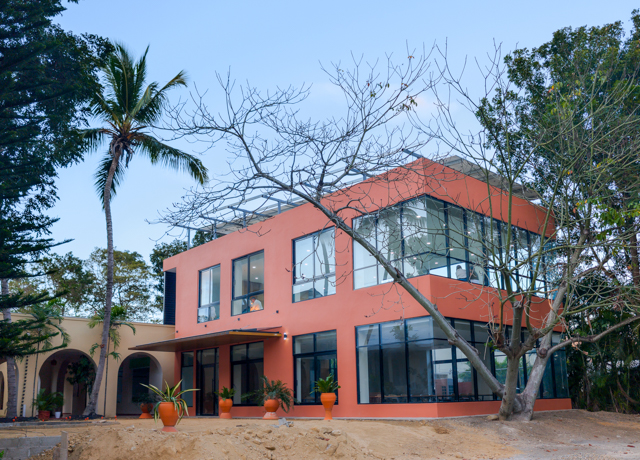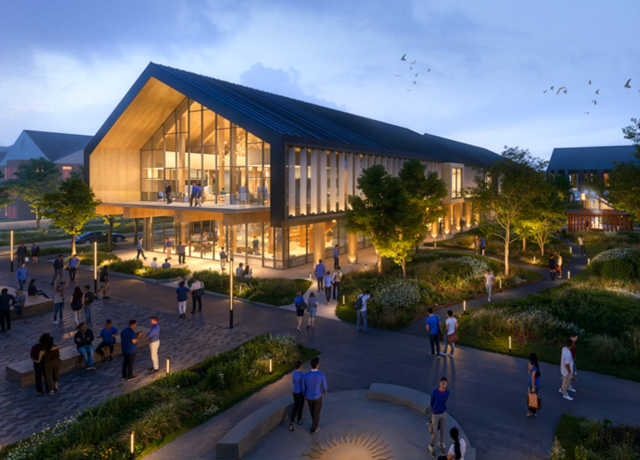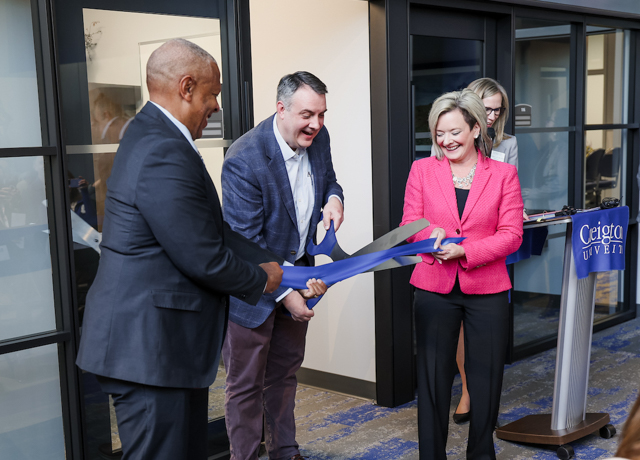Featured Testimonial About Creighton University

We’re committed to offering greater access for students who want to come to Creighton. Scholarships make this possible. They change the lives of our students and their families.

5 years
In July 2015, the Rev. Daniel S. Hendrickson, SJ, PhD, stepped into his role as Creighton’s 25th president and inaugurated a truly transformative time for the University.
Over his first five years, Creighton has seen continual record enrollment growth, achieved greater national recognition and embarked on one of the boldest endeavors in its 142-year history — the construction of a $100 million health sciences campus in Phoenix.
In his sixth year, Fr. Hendrickson and the University embark on an unprecedented time — for Creighton, for higher education, for the nation itself.
Classes resumed amid a pandemic, with Creighton offering the same excellent education but in ways focused on keeping students, faculty and staff safe and healthy.
Following the death of George Floyd, mass protests have sparked calls for police reform and a reckoning with race in America. This, says Fr. Hendrickson, is the time for Creighton and its students, faculty and staff to step up, to rise to the occasion.
“As a Jesuit, Catholic university,” he says, “we have a responsibility to be agents of change and make the world better for everyone.”
Fr. Hendrickson knows there is still much to be done, and he and others across campus are working to ensure that Creighton answers this moment meaningfully and effectively.
A focus on scholarships — Creighton’s No. 1 fundraising priority — will continue to increase the diversity of the student body, he says, offering greater access to a Creighton education, especially for first-generation students from underrepresented groups.
It’s also vital, Fr. Hendrickson says, to continue to engage issues of diversity at all levels of the University, including on and through the Board of Trustees. In this regard, Creighton recently named Catherine Hughes as its newest trustee. An African American and Omaha native, Hughes is the owner, co-founder and executive chairwoman of Urban One – the nation’s largest distributor of radio, TV and digital programming for Black audiences.
In a wide-ranging interview, Fr. Hendrickson discussed the role the University can play going forward, as well as the milestones of his first five years and the things that bring him joy about being Creighton’s leader.
Is there a moment or accomplishment that, for you, defines your tenure as president so far?
If we take a wide lens, I have tried to foster, nurture, and advance a campus culture that is supportive, collaborative, and engaged, and one that is intentionally and essentially Creighton — moving us significantly forward as both a source and force of Jesuit, Catholic higher learning.
In my inaugural address in 2015, I identified the importance of the humanities to cultivate ethical regard, critical thinking, cultural appreciation, empathy, eloquence, and so much more. It demands both self-awareness and awareness of others. Likewise, I outlined a priority for global education — that, too, allows us to better understand not only other peoples and cultures but our own unique identities and homes.
These two areas — global education and the humanities — remain areas of focus, sharpened dramatically by the establishment of the Kingfisher Institute for the Liberal Arts and Professions and the establishment of the Global Scholars Program. The Kingfisher Institute also provides opportunities to intensely reflect on and engage critical societal issues such as racism.
In addition to these priorities, in recent years, we have been creative in developing innovative academic programming, including public health, neurosciences, a physician assistant program, and a number of master’s degrees in the Heider College of Business. We also have attracted prominent speakers to our campus through our Presidential Lecture Series, including former U.S. Sen. and Secretary of Defense Chuck Hagel, former U.S. Sen. and Nebraska Gov. Bob Kerrey, Dominican author Julia Alvarez, and former Secretaries of State Madeleine Albright and Colin Powell. To have Albright and Powell, two internationally renowned figures, together on our campus was a great moment for the University.
What about Creighton’s future are you most excited for?
I am always excited by opportunities to enhance the student experience — whether that be through academics, research, or service. Our students are very focused, and our faculty and staff are committed to their success. To hear from graduates about how their Creighton education has made a difference in their lives, and to see how they are making a difference in the lives of others, is extremely gratifying.
Relative to the University itself, I am excited about our opportunity to address the dire need for health care professionals in the American Southwest through our new health sciences campus in Phoenix. When completed in 2021, this campus will be home to a four-year medical school and eventually accommodate nearly 900 students in medicine, pharmacy, occupational therapy, physical therapy, nursing, and physician assistant programs.
We have fostered strong partnerships through the Creighton University Arizona Health Education Alliance, and more recently with Arizona State University. I am grateful for dedicated and passionate alumni, donors, students, faculty, and staff who have stepped forward to build on Creighton’s more than a decade of health sciences programs in Phoenix and bring us to the doorstep of this innovative new campus. As construction continues, it has been exciting to watch it literally take shape.
How is Creighton well-positioned to make it through this moment?
Our University leaders have demonstrated responsible and strategic stewardship. While we have achieved record enrollments, we have also made a hard push for stewardship and cost savings, which has put us in a solid position.
More importantly, we have an inspiring vision for the University’s future. You see that in our expansion into Phoenix. You see it in our renovation of 24th Street. You see it in our priority of scholarships to diversify our campus with students who bring other perspectives and cultures to the University.
Why are scholarships especially important right now?
We’re committed to offering greater access for students who want to come to Creighton, especially for first-generation students and students from underrepresented groups.
Scholarships make this possible. They change the lives of our students and their families. They show our commitment to forming and empowering young people to be agents of change in the world.
They are especially important in this context of financial struggle amid the pandemic. Scholarships also recognize where people have not been able to gain access to places like Creighton over the years because of cultural or social factors. In doing so, scholarships help us increase diversity on campus.
How do our Creighton values help us right now?
The world has changed. And the more we can admit, internalize, and accept that, the better we will be. It affects how we do our daily work; how we teach and engage our students; how we creatively engage one another. I think we are ready to take the next step with a bold new slate of programs, while at the same time remaining true to our commitment to on-campus, in-classroom engagement.
In the time following George Floyd’s death, we are learning how we as an institution can be more supportive and recognize the problems of oppression and systemic injustice. As a Jesuit, Catholic university, we have a responsibility to be agents of change and make the world better for everyone.
In the Society of Jesus, whether we are teachers, social workers, doctors, lawyers or University presidents, we are all trained as Jesuits to help others flourish in their lives. In helping others flourish, we must recognize where others are oppressed and pushed to the margins of society. It is incumbent on Creighton University to go to the margins, to identify oppressive structures, and to continue dismantling those structures.
What have you learned in your first five years as Creighton president?
Through listening sessions and wide collaboration with so many — from faculty, staff, and students to Board members, alumni, donors, and others — we were able to successfully articulate a new vision for the University through the Creighton 150 strategic plan.
In some ways, it happened quickly and organically. It goes back to some of the things I have mentioned previously — the importance of the humanities and the liberal arts, the ambitions for global exposure.
I have also learned that with the complexity of an institution like Creighton and the demands of a job like this, there is a real need to be nimble and keep adjusting to circumstances.
That has been important along the way. It has required informed readjusting, and then moving forward in new directions.
Also, with this job, like many jobs, it is all about relationships — relationships with students, with faculty and staff, with the Board of Trustees, with alumni, parents, city officials. Forming and maintaining and celebrating those relationships is an important part of this job.
Over the past five years, this network of relationships has filled my life and brought to me all kinds of support, good advice, and different perspectives.
What’s a particular relationship that's meant a lot to you?
When I first came to Creighton, I did a lot of bike riding with students. I recall those as very special moments framed by great conversations. Students would talk about everything — from their experiences in the classroom to their career aspirations and life dreams. I remember, on one particular bike ride, a student rehearsed the talk he was going to give at a retreat. Students also would ask me why I became a Jesuit or what I like about being the Creighton president. This was all happening while we were going 18 miles an hour on bike trails.
When you look at the actual physical growth Creighton has seen and is seeing — the 24th Street project, the dental school, the Phoenix campus, the renovations in Harper — what’s it like to see all that careful planning and work come to fruition? What does it feel like as the leader of Creighton to see Creighton growing right before your eyes?
When alumni who have not been here in a long time return to campus, they are thrilled with the work started in 2000 (begun under the late Rev. John P. Schlegel, SJ, and continued under the Rev. Timothy R. Lannon, SJ, BS’73), the expansion to the east on the other side of 24th Street. They are very inspired by that expansion, and they like seeing our footprint and Creighton’s role in transforming downtown Omaha.
We continue to participate in that expansion. The construction of our state-of-the-art dental school on 21st Street created a new front door to the campus – a strong, inspirational beacon of the University. That is a terrific building. Erecting the Heaney Pedestrian Bridge over the North Freeway, and connecting to the Atlas apartment complex at the former site of Creighton University Medical Center, was both practical and symbolic.
Renovation of 24th Street is much more than a capital project. There is something truly symbolic about bringing the Creighton architecture onto the street and redesigning how people experience our campus, and serving as an important connection point with our neighbors to the north and south.
With these exciting projects, we are making a bold statement and expanding the reach of our influence and mission.
When you go to work, what are you most excited about? What about being Creighton president brings you joy?
I really enjoy meeting and engaging our alumni in Denver or Chicago, Washington, D.C., Los Angeles, talking to groups of 250 people to showcase Creighton’s success and our bright future. I get a lot of energy out of that. I get nervous every single time at these events, yet I am also fueled by them, by this conversation about the mission and identity of the institution and our vision for the future.
On campus, I love going over to Starbucks for a quick recharge, to get an espresso and speak with students in line and linger for a few minutes after.
This job is such a combination of thinking, reading, praying, deciding, responding, and so on, and a push and pull in so many different directions. I thrive on the diversity of it — going to meetings, traveling to meet alumni, and walking around campus to speak with students. These past five years have been an exciting mixture of responsibilities and experiences.
If you had a time machine and could go back five years and give your 2015-self one piece of advice on being Creighton president, what would it be?
Everyone, it seems, has advice on leadership. Some of the best advice I have received is to trust those around you — celebrate their achievements, their different perspectives, learn from them. No matter who you are, you cannot do this on your own.


